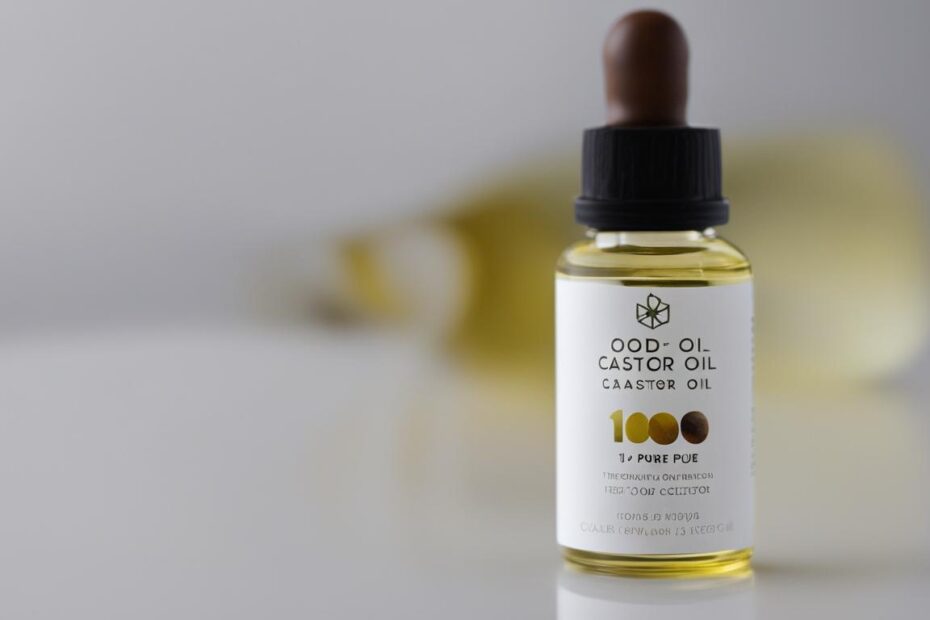Welcome to our informative article about ingestible castor oil. If you’re wondering about the benefits of ingesting castor oil, its use for internal purposes, or how to safely consume it, you’ve come to the right place. Castor oil, derived from the seeds of the castor oil plant, serves various purposes in the chemical industry and has also found its way into the realm of medicine.
One prominent application of castor oil is its use as a stimulant laxative, approved by the FDA, to relieve temporary constipation. However, it’s essential to note that the ingestion of castor oil should always be done under medical supervision due to potential side effects such as diarrhea, cramping, and electrolyte imbalances. To avoid any risks, long-term use or consumption during pregnancy should be strictly guided by a healthcare provider.
Key Takeaways:
- Castor oil is derived from the seeds of the castor oil plant and is primarily used in the chemical industry.
- When it comes to ingesting castor oil, it should always be done under the supervision of a healthcare professional.
- Castor oil capsules are available for ingestion and have been approved for temporary relief of constipation by the FDA.
- While ingestible castor oil has potential benefits, it’s important to use it responsibly and seek medical guidance before oral consumption or application.
- Ingesting castor oil may have potential side effects like diarrhea, cramping, and electrolyte imbalances, making medical supervision crucial.
Castor Oil for Constipation Relief
Castor oil is a popular natural remedy for constipation, known for its effectiveness as a laxative. It acts as a stimulant, triggering muscle contractions in the intestines and promoting bowel movements. People often turn to castor oil when seeking temporary relief from constipation.
However, it is crucial to exercise caution when using castor oil for constipation. While the FDA approves its use for this purpose, it is recommended to do so under medical supervision. This is because castor oil can have potential side effects, such as cramps and bloating.
In addition to its use as a laxative, castor oil can also be utilized for bowel cleansing before certain medical procedures. However, other laxatives are often preferred for this purpose due to the potential risk of side effects associated with castor oil.
If you are experiencing constipation, it is important to avoid long-term use of castor oil without medical guidance. Instead, consult a healthcare professional to understand the underlying cause of your constipation and discuss appropriate treatment options.
Overall, castor oil can provide temporary relief for constipation when used cautiously. It is essential to be mindful of potential side effects and consult a healthcare professional for guidance before incorporating castor oil into your constipation relief regimen.
| Benefits of Castor Oil for Constipation | Side Effects of Castor Oil for Constipation | Using Castor Oil Cautiously |
|---|---|---|
|
|
|
Castor Oil for Skincare
Castor oil is a popular ingredient in skincare products due to its moisturizing properties. It acts as an occlusive moisturizer, creating a protective barrier on the skin to retain moisture and promote hydration. The rich texture of castor oil makes it especially beneficial for dry and dehydrated skin.
When using castor oil on the skin, it is important to dilute it with other oils to avoid potential irritation. Mixing a small amount of castor oil with a carrier oil, such as almond oil or coconut oil, can help ensure safe and effective use. This also allows for better absorption and distribution of the oil on the skin.
The moisturizing properties of castor oil make it suitable for various skin conditions. Its antimicrobial and anti-inflammatory properties may have potential benefits for acne-prone skin, eczema, and psoriasis. Castor oil can help soothe inflammation, reduce redness, and promote healing of the skin.
Furthermore, castor oil is known for its wound healing properties. It is often used in wound dressings to create a moist environment that supports the healing process and helps prevent infection. The viscous nature of castor oil helps protect the wound and keeps it hydrated, facilitating faster healing.

The key benefits of castor oil for skincare include:
- Deep moisturization and hydration
- Potential benefits for acne-prone skin, eczema, and psoriasis
- Anti-inflammatory properties to soothe redness and irritation
- Wound healing properties to support the healing process
However, it is important to note that castor oil should only be used on the skin under medical supervision for wound care. When using castor oil for skincare, it is recommended to perform a patch test first to check for any adverse reactions. If any discomfort or irritation occurs, discontinue use and consult a dermatologist.
| Benefits of Castor Oil for Skincare | How to Use |
|---|---|
| Moisturizes and hydrates the skin | Dilute with carrier oil and apply to the skin |
| Potential benefits for acne-prone skin, eczema, and psoriasis | Apply diluted castor oil to affected areas |
| Reduces inflammation and soothes irritation | Gently massage diluted castor oil onto the skin |
| Promotes wound healing | Apply castor oil to clean wounds under medical supervision |
Other Uses of Castor Oil
In addition to its primary uses, castor oil has alternative applications. It can be beneficial for denture care, hair care, and more. Let’s explore these alternative uses and the precautions to consider when using castor oil on your hair and dentures.
Castor Oil for Denture Care
Castor oil can play a role in denture care by reducing the growth of bacteria and fungi that can lead to oral infections. Soaking dentures in a solution containing castor oil may help prevent denture-related stomatitis, a condition characterized by inflammation of the oral mucosa. However, it is important to consult a healthcare professional before incorporating castor oil into your denture care routine to ensure it is suitable for your specific needs. They can provide guidance on the most effective and safe methods of using castor oil for denture care.
Castor Oil for Hair Care
Castor oil has gained popularity as a potential aid for hair care, although scientific evidence supporting its effectiveness is limited. It is believed to moisturize and condition the hair, promoting shine and strength. However, it is crucial to exercise caution when using castor oil on your hair. In rare cases, it has been associated with a condition called acute hair felting, which can cause severe tangling and may require cutting off the affected hair. Precautions should be taken, particularly for individuals with long hair, to avoid potential complications. It is advisable to seek advice from a hair care professional or dermatologist before incorporating castor oil into your hair care routine.

In Conclusion
Castor oil offers a range of potential benefits when used responsibly and under the guidance of healthcare professionals. As a stimulant laxative, it can provide short-term relief from constipation. In addition, castor oil has moisturizing properties that can be beneficial for the skin and may contribute to wound healing.
However, it is important to exercise caution and avoid long-term use of castor oil without medical supervision. Using castor oil in excessive amounts or for extended periods can lead to side effects such as diarrhea, cramping, and electrolyte imbalances. Pregnant women should also consult their healthcare providers before using castor oil, as it may not be suitable for their specific circumstances.
To ensure safe and effective use of castor oil, it is essential to consult healthcare professionals before ingesting or applying it. They can provide personalized recommendations based on an individual’s medical history and specific needs. Responsible use of castor oil involves following the recommended dosage, understanding potential risks, and seeking professional guidance to address any concerns or doubts.
By using castor oil responsibly and consulting healthcare professionals, individuals can maximize the benefits of this natural remedy while minimizing any potential risks or adverse effects.
FAQ
What are the benefits of ingesting castor oil?
Castor oil can be used as a stimulant laxative for short-term relief of constipation. It may also have potential moisturizing and wound healing properties when used externally. However, it is important to use castor oil responsibly and under medical supervision.
Is castor oil safe for internal use?
Castor oil can be ingested, but it should only be done under medical supervision. While it is approved by the FDA as a stimulant laxative, it can have side effects such as diarrhea, cramping, and electrolyte imbalances. Long-term use and use during pregnancy should be avoided unless prescribed and monitored by a healthcare provider.
Can I use castor oil orally in capsule form?
Yes, castor oil is available in capsule form for oral consumption. However, it is still important to consult a healthcare professional before using castor oil capsules to ensure safe and appropriate use.
How can castor oil be used for constipation relief?
Castor oil works as a stimulative laxative, causing the muscles in the intestines to contract and promoting bowel movements. It is approved by the FDA for temporary relief of constipation. However, it should only be used under medical supervision due to potential side effects like cramps and bloating. Long-term use should be avoided.
What are the potential benefits of using castor oil on the skin?
Castor oil has moisturizing properties and can help retain moisture in the skin. It may also have potential benefits for certain skin conditions due to its antimicrobial and anti-inflammatory properties. However, castor oil should be diluted with other oils before applying to the skin to avoid potential irritation. It is important to consult a healthcare professional before using castor oil on the skin.
Can castor oil be used for wound healing?
Yes, castor oil is sometimes used in wound dressings to create a moist environment that promotes healing and helps prevent infection. However, it should only be used under medical supervision in wound care.
Are there other uses for castor oil?
Yes, castor oil can be used for denture care to reduce the growth of bacteria and fungi that can cause oral infections. It is also sometimes used for hair care, although caution should be taken as it has been associated with a rare condition called acute hair felting. It is important to consult a healthcare professional before using castor oil for denture care or hair care.
What precautions should be taken when using castor oil on hair and dentures?
When using castor oil on hair, especially for people with long hair, precautions should be taken due to the risk of acute hair felting. It is important to follow guidelines and use caution to prevent severe tangling that may require cutting off the hair. When using castor oil for denture care, it is recommended to consult a healthcare professional for guidance on its appropriate use.
What are the benefits and risks of using castor oil?
Castor oil can provide short-term relief for constipation and may have potential benefits for skin conditions and wound healing. However, it should be used responsibly and under medical supervision. Side effects such as diarrhea, cramping, and electrolyte imbalances can occur. Long-term use and use during pregnancy should be avoided without medical guidance.
Should I consult a healthcare professional before using castor oil?
Yes, it is important to consult a healthcare professional before ingesting or applying castor oil to ensure safe and effective use. They can provide guidance on appropriate dosage, usage, and any potential risks or interactions.
